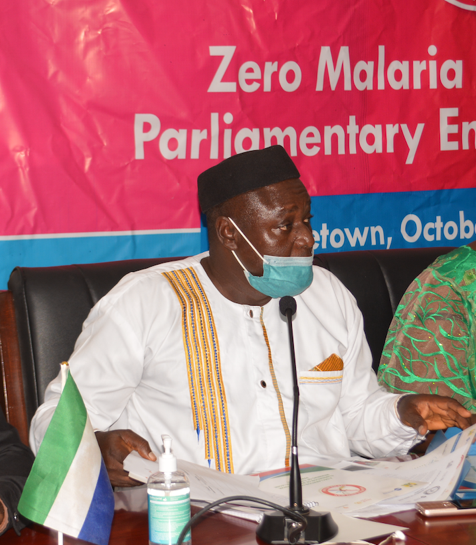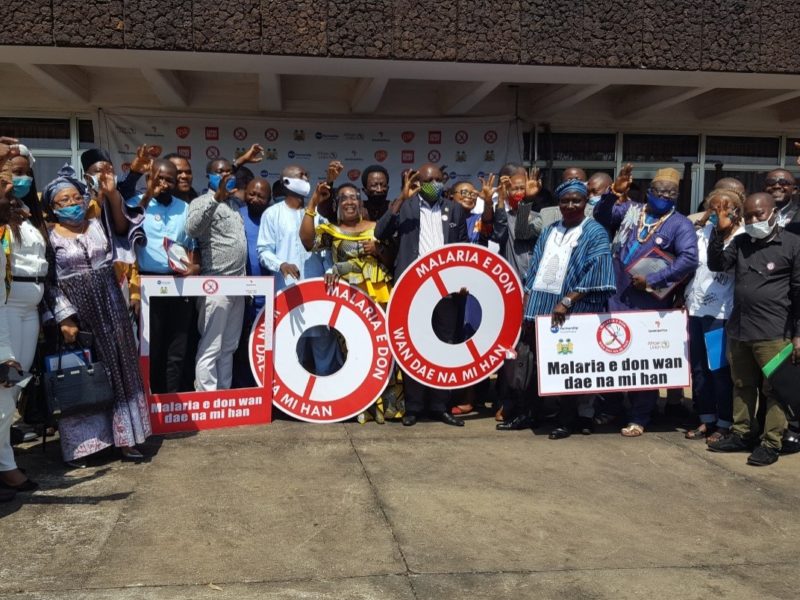Good religion and good governance – Tony Blair and Sheik Abu Bakarr Conteh on World Malaria Day
The significance of World Malaria Day on 25th April is likely to be different if you live in London or Freetown. For those who live in Sierra Leone, it will be a reminder again that malaria is the number one killer of young children. (Photo: Sheik Abu Bakarr Kamara)
In the UK there may not even be the memory that in the Kent marshes malaria killed whole families in the 18th century. It may not seem relevant. But it is.
The names on gravestones in Kent, like the names of children buried in Sierra Leone, each represent a tragic waste of a life. They each tell a story of family loss that opens up the full meaning of the statistics so carefully collected by the Ministry of Health – for malaria is easily preventable and the death toll is utterly unacceptable.
So why has Africa failed to eradicate malaria when Europe succeeded – even if only relatively recently in living memory of the last generation? The obvious answer is poverty and lack of resources. But we are convinced that this must not be the last word. There is another more hopeful story of better health for all – a key element for countries such as Sierra Leone taking off economically.
The main threat to this happening is fatalism: the idea that it is out of our hands to do anything about malaria. It is just inevitable. But responsibility for the preservation and health of our families is central to the principles of Islam, maqasids, and to Christian moral teaching, the two great religions of Africa. In Quran 66:V6 Allah said: “O you who believe save yourself and your families from fire whose fuel are men and stones”.
A secondary threat is the lack of concerted action, the result of bad governance, different forms of conflict, the wrong priorities. The malaria parasite concentrates with undivided effort to reproduce itself inside human beings and mosquitoes. We need to combat it with equally undivided focus.
We believe that Sierra Leone is countering these threats. The Inter-Religious Council, the Christian and Muslim Health Associations are working together with the Ministry of Health with the support of the Tony Blair Faith Foundation in a growing national campaign to combat the disease. The idea is very simple. Religious leaders have authority and have a privileged position in transmitting life-saving public health messages through the extensive networks of their faith communities. The Christian Sunday sermon and the Muslim Friday sermon, for example, offer exactly the same opportunities to pass on the message and leaders of these two faiths are the moral guarantors of the State and would be accountable to Allah for any negligence.
The model is also simple. Religious leaders give their time for being trained in malaria prevention, and in turn train trusted and senior members of their communities as “malaria champions”. In a cascade effect the much larger number of malaria champions undertake household visits to convey the five core dos and don’ts prescribed by the malaria unit of the Ministry of Health to families throughout the country.
The effectiveness of this health education depends on the availability of bed-nets and the regular stocking of health clinics with anti-malarial drugs. We have the Global Fund, the US Presidents, Malaria Initiative, Bill Gates Foundation and the United Nations Secretary-General’s Special Envoy, Ray Chambers to thank for this now being a reality for responsive African governments. It needs both good governance and good religion; the faith communities can massively complement the work of the Ministry of Health.
We know it can be done and is being done most effectively in Sierra Leone, building on a programme of free health care to improve maternal and child health. The problem we face is that there are signs that the global economic crisis is encouraging donor governments to cut back and renege on pledges already made. This could be extremely dangerous knowing, as we now do, that the malaria parasite in Asia is slowly gaining immunity to the last effective artemisinin-based malaria drug. But it would also be a tragic lost opportunity given the rapid decrease in malaria deaths brought about by concerted action in the last decade.
We face the next decade with potentially an even more lethal form of malaria that respects no national frontiers. Africa does not have time on its side. The message of this World Malaria day, whoever you are, wherever you live, is the same: do not pull out the carpet from under good governance and good religion; Africa needs both.
Written by Tony Blair and Sheik Abu Bakarr Conteh to mark the significance of World Malaria day
Stay with Sierra Express Media, for your trusted place in news!
© 2012, https:. All rights reserved.






